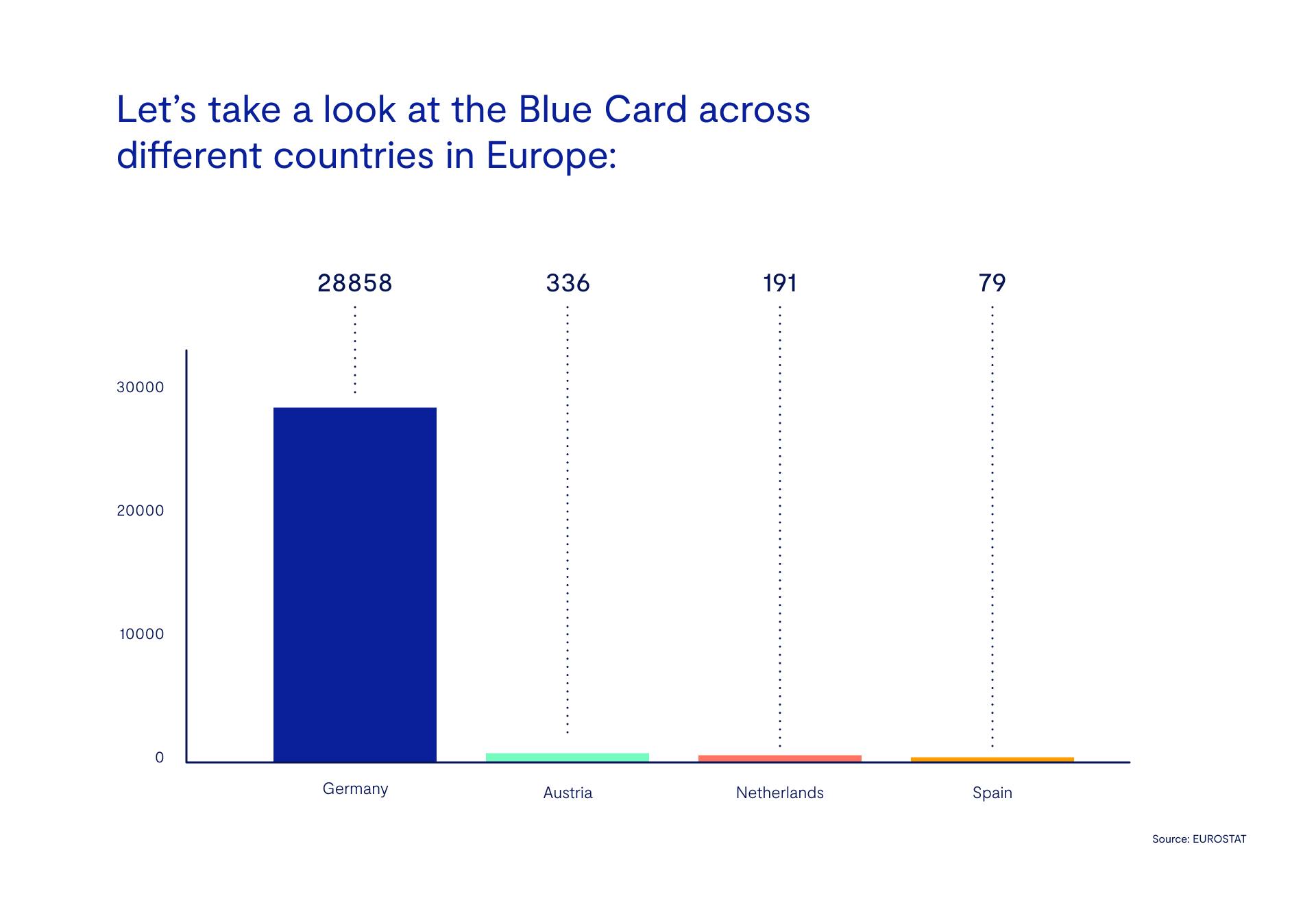When defining your Global Mobility strategy, you are most likely considering how to grow and shape your international team by bringing new talent onboard. When thinking about hiring internationally within the EU, immigration quickly becomes a topic. You might have heard about the EU Blue Card, but are maybe not entirely sure what this work permit is all about and how to get started with international hiring.
No worries! We will guide you through the bureaucratic Blue Card jungle and explain all the benefits the Blue Card brings with it.
What is the EU Blue Card?
The idea of the EU Blue Card was to fill skill shortages in Europe’s labour markets, minimize bureaucracy and enhance alignment within the EU. This work permit gives highly-qualified workers from outside the EU the right to live and work in an EU country. It offers many perks such as easier family reunion and as well the opportunity to obtain permanent residency more quickly.
The Blue Card applies in 25 of the 27 EU countries, it doesn’t apply to Denmark and Ireland.
On 17th May 2021, the European Commission welcomed the agreement reached by the European Parliament and the Council on new rules for the entry and residence of highly skilled workers from outside the EU under the revised Blue Card Directive.
This scheme introduced efficient rules for attracting highly skilled talent to the EU, including more flexible admission conditions, qualifications and skills equivalency and Intra-EU Mobility. The European Parliament and the Council still need to formally confirm the political agreement by adopting the EU Blue Card Directive - we will keep you updated.
Who is eligible for the EU Blue Card?
- Highly-qualified or skilled workers
- Researchers
- Students
- Vocational trainees
- Seasonal workers
- Intra-corporate transfers
- Self-employed/entrepreneurs
What is the EU Blue Card about?
In comparison to regular, national work permits, the Blue Card comes with a range of benefits:
- The employee can travel (not work though!) freely within the EU
- If Blue Card holders are in the possession of a Blue Card for at least 18 months and lived in the country in which the permit was granted, they can move to another country and re-apply for the Blue Card there
- It’s easier to relocate with a spouse
- At some authorities it’s easier to book appointments for Blue Card candidates
Let’s take a look at the Blue Card across different countries in Europe:
While the EU Blue Card is in place in most EU countries, German companies really love the Blue Card: Germany issues more Blue Cards than all other EU states combined (EUROSTAT, 2019). EU countries have national immigration policies in place to attract highly-skilled talent, which explains this difference (in parts).

The Blue Card requirements: Example Germany
So, what do you need to consider if you would like to hire e.g. a software engineer from outside the EU for your tech team? In order to obtain the Blue Card in Germany for your future employee, the following prerequisites need to be taken into account:
- The position in Germany must be remunerated with a gross annual income of at least EUR 48,300 (in 2025). A gross annual salary of at least EUR 43,759.80 (in 2025) is required for employees in skilled labour shortages as in the fields of mathematics, IT, natural sciences, engineering and human medicine. In such cases, the German Federal Employment Agency must approve the request for employment.
- The candidate must provide proof of having completed higher education which needs to match the job title. If the e.g. university degree was not acquired in Germany, it must either be recognized or be comparable to a German higher education qualification. The degree can be checked in the anabin database. If the degree isn’t recognized in Germany, it’s possible to obtain a statement of Comparability by the Central Office for Foreign Education.
Good to know:
- Visa-free entry: Nationals of Australia, Canada, Israel, Japan, the Republic of Korea, New Zealand, the United Kingdom of Great Britain and Northern Ireland and the United States of America can enter Germany visa-free. However, they must subsequently apply for the EU Blue Card at the responsible immigration authority within three months. Important: It’s only possible to take up employment once the EU Blue Card has been issued.
- Permanent residency: Blue Card holders can obtain permanent residency after a period of 33 months. If the employee can proof efficiency in German at level B1 or higher, this period can be reduced to 21 months.
- Validity: The Blue Card is issued for a period of four years if the employment contract is unlimited. In the case that the duration of the employment contract is shorter than four years, it is issued for the duration of the employment contract, plus three months
You have now all the information about the Blue Card in a nutshell, but don’t know how to start the application process? No worries, we got you covered! Download our Essential checklist to the EU Blue Card and get to know how you can support your employee with the application. You still have questions about the EU Blue Card? Get in touch with us, we can help you!
The contents of our website, specifically the articles discussing legal topics, are researched with the utmost care. However, the provider cannot assume any liability for the correctness, completeness, and topicality of the information provided. In particular, the information is of a general nature and does not contain legal advice in individual cases. For the solution of specific legal matters, please consult a lawyer.
